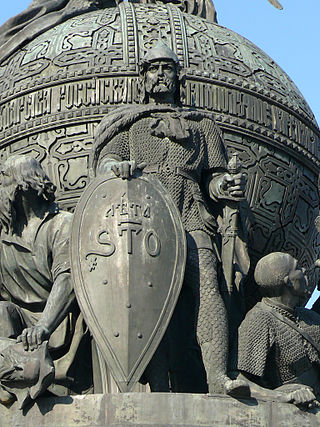
Rurik was a semi-legendary Varangian chieftain of the Rus' who, according to tradition, was invited to reign in Novgorod in the year 862. According to the Primary Chronicle, Rurik was succeeded by his kinsman Oleg who was regent for his infant son Igor.

A boyar or bolyar was a member of the highest rank of the feudal nobility in many Eastern European states, including Kievan Rus', Bulgaria, Russia, Wallachia and Moldavia, and later Romania, Lithuania and among Baltic Germans. Boyars were second only to the ruling princes from the 10th century to the 17th century. The rank has lived on as a surname in Russia, Finland, Lithuania and Latvia where it is spelled Pajari or Bajārs/-e.

Ivan IV Vasilyevich, commonly known as Ivan the Terrible, was Grand Prince of Moscow and Sovereign of all Russia from 1533, and the first crowned Tsar of all Russia from 1547 until his death in 1584.

Koschei, often given the epithet "the Immortal", or "the Deathless", is an archetypal male antagonist in Russian folklore.

Dazhbog, alternatively Daždźbok, Dazhboh, Dažbog, Dazhdbog, Dajbog, Daybog, Dabog, Dazibogu, or Dadźbóg, was one of the major gods of Slavic mythology, most likely a solar deity and possibly a cultural hero. He is one of several authentic Slavic gods, mentioned by a number of medieval manuscripts, and one of the few Slavic gods for which evidence of worship can be found in all Slavic tribes.

The Tale of Igor's Campaign or The Tale of Ihor's Campaign is an anonymous epic poem written in the Old East Slavic language. The title is occasionally translated as The Tale of the Campaign of Igor, The Song of Igor's Campaign, The Lay of Igor's Campaign, The Lay of the Host of Igor, and The Lay of the Warfare Waged by Igor.
Grand prince or great prince is a title of nobility ranked in honour below Emperor, equal to Archduke, King, Grand duke and Prince-Archbishop; above a Sovereign Prince and Duke.

Old East Slavic literature, also known as Old Russian literature, is a collection of literary works of Rus' authors, which includes all the works of ancient Rus' theologians, historians, philosophers, translators, etc., and written in Old East Slavic. It is a general term that unites the common literary heritage of Russia, Belarus and Ukraine of the ancient period. In terms of genre construction, it has a number of differences from medieval European literature. The greatest influence on the literature of ancient Rus' was exerted by old Polish and old Serbian literature.
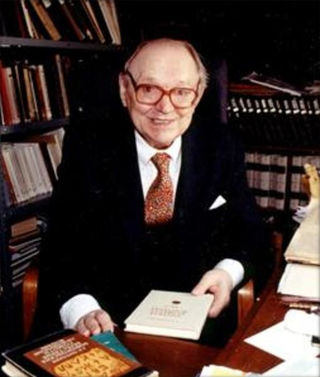
Omeljan Yosypovych Pritsak was the first Mykhailo Hrushevsky Professor of Ukrainian History at Harvard University and the founder and first director (1973–1989) of the Harvard Ukrainian Research Institute.
Daniel C. Waugh is a historian based at the University of Washington. He did his undergraduate work at Yale University, and in 1963 graduated with a B.A. in Physics. In 1965, he finished his Master's on the Regional Studies of the Soviet Union at Harvard University, and seven years later he completed his Ph.D. at the same institution. The same year, 1972, he began his employment at the University of Washington, and has remained there ever since. He taught in three different departments, namely the departments of History, International Studies, and Slavic and East European Languages and Literature until 2006. His main academic interests are Central Asia and medieval and early modern Russia, although he once focused on Ottoman history. He is the director of the Silk Road Seattle project and editor of the annual journal of the Silkroad Foundation.
Giacomo Micaglia, was an Italian linguist and lexicographer, of Slavic ancestry. He was born in the town of Peschici (Apulia), at that time under the Kingdom of Naples. He said about himself to be "an Italian of Slavic language".
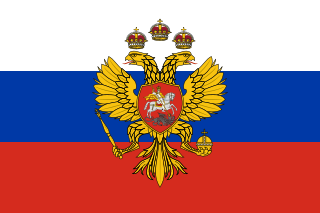
The Tsardom of Russia or the Russian Tsardom and Tsardom of Rus', also known as the Tsardom of Muscovy, was the centralized Russian state from the assumption of the title of tsar by Ivan IV in 1547 until the foundation of the Russian Empire by Peter the Great in 1721.
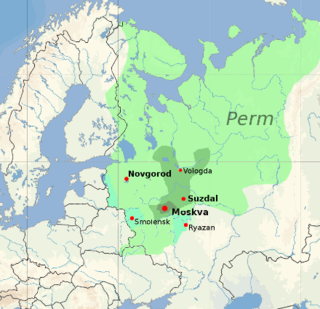
The Grand Duchy of Moscow, also known as the Principality of Moscow, or simply Muscovy, was a principality of the Late Middle Ages centered on Moscow. It eventually evolved into the Tsardom of Russia in the early modern period. The princes of Moscow were descendants of the first prince Daniel, referred to in modern historiography as the Daniilovichi, a branch of the Rurikids.

The emperor or empress of all the Russias or all Russia, often titled tsar or tsarina/tsaritsa, was the monarch of the Russian Empire.
John Lister Illingworth Fennell was a British historian of medieval Russian history and of Russian literature. He taught at Cambridge, Nottingham, and London universities, and from 1964 at Oxford, where he was a fellow first at University College, and later at New College. He retired in 1985. His specialty was as a historian, translator, philologist, editor, and teacher of advanced students.
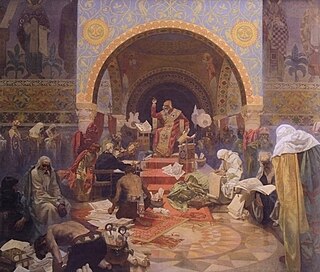
Tsar, also spelled czar, tzar, or csar, was a title used by Slavic monarchs. The term is derived from the Latin word caesar, which was intended to mean "emperor" in the European medieval sense of the term—a ruler with the same rank as a Roman emperor, holding it by the approval of another emperor or a supreme ecclesiastical official —but was usually considered by Western Europeans to be equivalent to "king". It lends its name to a system of government, tsarist autocracy or tsarism.
Bohemisms, or Czechisms, are words and expressions borrowed or derived from the Czech language. The former term is derived from the historical name Bohemia for Czech lands.
This is a select bibliography of post World War II English language books and journal articles about the history of Russia and its borderlands from the Mongol invasions until 1613. Book entries may have references to reviews published in academic journals or major newspapers when these could be considered helpful.












